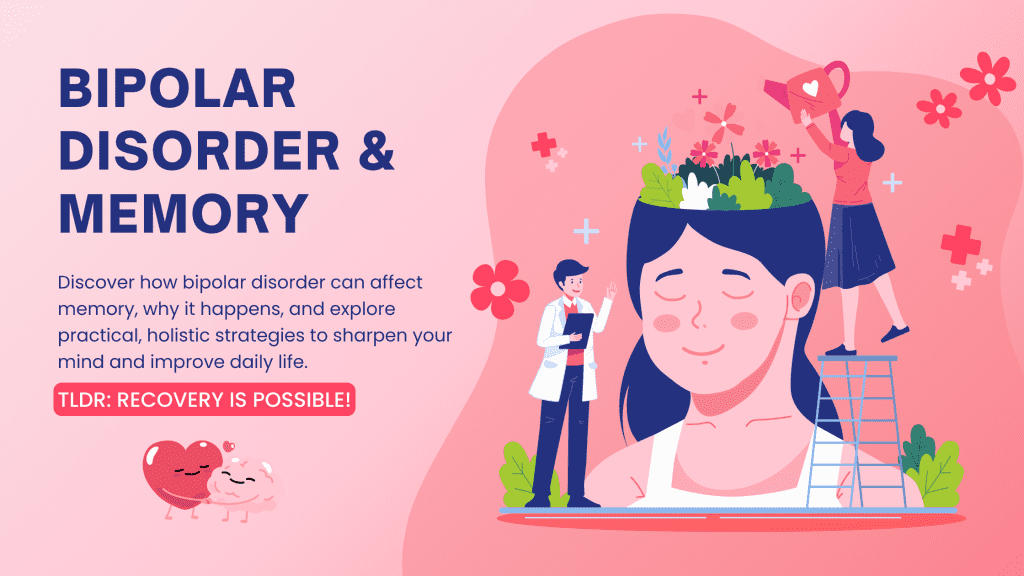Bipolar Disorder & Memory
Understanding the Connection and Finding Solutions
Living with bipolar disorder can feel like riding an emotional rollercoaster. But beyond the mood swings, many people with bipolar disorder also face another challenge: memory problems. If you’ve ever wondered why you sometimes forget names, lose track of tasks, or feel like your brain is in a fog, you’re not alone. Let’s explore how bipolar and memory are connected, what causes these issues, and what you can do to help your brain stay sharp.
For more guidance on bipolar disorder, check out our book and masterclass to reclaim control of your life. You can also check out our free resources.
What Is Bipolar Disorder?
Bipolar disorder is a mental health condition that causes dramatic shifts in mood, energy, and activity levels. These changes are much more intense than the ups and downs most people experience. People with bipolar disorder go through periods of mania (feeling very “up” or energetic) and depression (feeling very “down” or sad), with times of normal mood in between
How Does Bipolar Disorder Affect Memory?
Many people with bipolar disorder experience memory problems, sometimes called “bipolar brain fog” or “bipolar blackout.” These issues can show up as:
- Forgetting recent events or conversations
- Struggling to remember names or appointments
- Losing track of daily tasks
- Trouble focusing or paying attention
Memory problems can happen during manic or depressive episodes, but they can also stick around even when your mood is stable. Research shows that about 40–60% of people with bipolar disorder have some kind of memory or thinking problem.
Why Do Bipolar and Memory Problems Happen?
There are several reasons how bipolar can impact one’s memory:
- Brain Changes: Bipolar disorder can affect parts of the brain important for memory, like the prefrontal cortex and hippocampus. These areas help us plan, pay attention, and store memories.
- Mood Swings: Extreme moods put stress on the brain and can make it harder to focus and remember things.
- Medication Side Effects: Some medicines for bipolar disorder, like lithium, can cause memory problems for some people.
- Sleep Problems: Not getting enough sleep (which is common in bipolar disorder) can make memory worse.
- Other Factors: Stress, anxiety, and even poor nutrition can also play a role.
Types of Memory Affected
Bipolar disorder can impact different types of memory, including:
- Short-term memory: Forgetting things you just learned or heard.
- Long-term memory: Having trouble recalling things from the past.
- Working memory: Difficulty holding information in your mind while using it (like remembering a phone number long enough to dial it).
How Memory Problems Affect Daily Life
Memory issues can make everyday life more difficult. You might:
- Miss appointments or forget to pay bills
- Struggle at work or school
- Feel embarrassed in social situations
- Have trouble following conversations or instructions
These challenges can affect your confidence and make managing bipolar disorder even harder.
Holistic Solutions
The good news is that there are many ways to support your memory and brain health if you have bipolar disorder. Here are some holistic strategies you can try:
Prioritize Sleep
Sleep is crucial for memory and mood. Try to:
- Go to bed and wake up at the same time every day
- Avoid screens before bed
- Create a relaxing bedtime routine
- Talk to your doctor about sleep problems-treatments like cognitive behavioral therapy for insomnia (CBT-I) can help.
Some people with bipolar disorder find that melatonin supplements help improve sleep, but always check with your doctor first, as melatonin can interact with other medications and isn’t right for everyone.
Practice Meditation and Mindfulness
Meditation and mindfulness exercises can help reduce stress, improve focus, and even boost memory. Just a few minutes a day can make a difference. Try:
- Guided meditation apps like headspace
- Deep breathing exercises
- Mindful walking or stretching
Eat Brain-Healthy Foods
A balanced diet supports brain health. Focus on:
- Leafy greens, berries, and colorful veggies
- Fish rich in omega-3s (like salmon)
- Whole grains and nuts
- Drinking plenty of water
Consider Supplements (With Your Doctor’s Guidance)
Some supplements may help with memory loss, but always talk to your healthcare provider before starting anything new. Options to discuss include:
- Ashwagandha: May improve memory and reaction time.
- B Vitamins (B6, B12): Support brain health and energy.
- Magnesium: May help with mood and cognitive function.
- L-Theanine: Promotes relaxation and better sleep.
- Coenzyme Q10 (CoQ10): Supports energy production in brain cells.
- Zinc: Important for brain and nervous system health.
- Melatonin: Can help with sleep, which in turn supports memory.
Remember, supplements can interact with medications, so always check with your doctor first.
Final Thoughts
Memory problems for individuals diagnosed with bipolar disorder can be frustrating, but you’re not powerless. With the right strategies-like good sleep, meditation, healthy food, and smart supplements-you can support your brain and improve your quality of life. Remember, everyone’s journey with bipolar disorder is different, so finding what works best for you may take time. Don’t hesitate to reach out for help and keep trying new approaches until you find your best balance.
You are not alone, and with the right support, you can thrive.
Citations:
- https://www.medicalnewstoday.com/articles/314328
- https://www.everydayhealth.com/bipolar-disorder/bipolar-disorder-and-memory-loss.aspx
- https://www.verywellmind.com/understanding-bipolar-disorder-memory-loss-5509376
- https://www.verywellhealth.com/bipolar-disorder-and-memory-problems-8725199
- https://faithbehavioralhealth.com/bipolar-memory-loss/
- https://psychcentral.com/bipolar/herbs-for-bipolar-disorder
- https://www.amenclinics.com/blog/does-bipolar-disorder-cause-memory-loss/
- https://www.bphope.com/top-bipolar-vitamins-and-supplements-and-what-to-avoid/
- https://www.lifeadjustmentteam.com/how-does-bipolar-disorder-affect-your-memory/
- https://pmc.ncbi.nlm.nih.gov/articles/PMC4347516/
- https://www.everydayhealth.com/bipolar-disorder/bipolar-treatments/vitamins.aspx
- https://www.santecenter.com/rehab-blog/10-supplements-for-bipolar-disorder-management/



